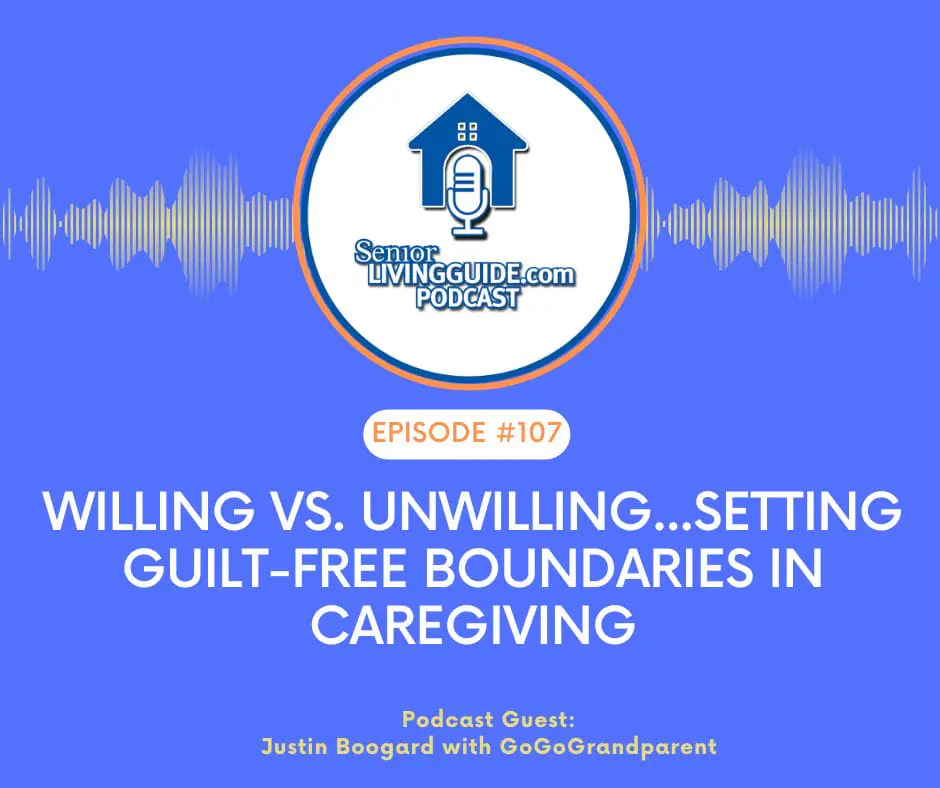As a caregiver, preparing for your aging parent’s journey can feel overwhelming. But what if I told you there’s a way to approach this challenge with confidence and clarity? In a recent SeniorLivingGuide.com Podcast episode we were joined by Justin Boogard, co-founder and CEO of GoGo Grandparent and GoGo Cares where we deep dived into the concept of creating a caregiving playbook.
Setting the Stage: Why a Playbook Matters
Justin emphasizes the importance of having a caregiving playbook:
“There’s a lot of resources out there for like how to raise children, but not nearly as much that offer tactical guidelines around what to do with aging parents.”
This insight highlights a crucial gap in our approach to eldercare. We often find ourselves unprepared for the challenges that come with caring for aging parents. But what if we could change that narrative?
Understanding Your Caregiving Motivation
Before diving into the practical aspects of caregiving, it’s essential to understand your motivation. Ask yourself:
– Is it out of love?
– Is it out of duty?
– Is it out of gratitude?
Understanding your “why” can help you navigate the challenges ahead with more resilience and purpose.
The Two Pillars of Caregiving: ADLs and IADLs
Justin introduces us to two critical concepts in eldercare:
- Activities of Daily Living (ADLs): These include walking, bathing, dressing, and eating.
- Instrumental Activities of Daily Living (IADLs): These involve tasks like transportation, meal management, and medication management.
Understanding these pillars can help you anticipate and plan for your parent’s needs more effectively.
Creating Your Caregiving Boundaries
One of the most powerful insights from our conversation with Justin is the importance of setting clear boundaries. He suggests:
“You maybe are totally comfortable calling your mom every day, but you’re not willing to quit your job to drive her to medical appointments or to be there. That’s a totally reasonable thing to desire.”
This approach isn’t about limiting your care, but about ensuring sustainability and preventing caregiver burnout.
Practical Solutions for Common Caregiving Challenges
Justin offers several practical solutions for common caregiving challenges:
– For meals: Consider services like Meals on Wheels or local nonprofits.
– For home upkeep: A regular cleaning service can maintain tidiness and provide an extra set of eyes on your loved one’s living situation.
– For socialization: Don’t underestimate the importance of regular social interactions, even if it’s just a monthly trip to the hair salon.
The Importance of Self-Care in Caregiving
Remember, caregiving is a marathon, not a sprint. Justin emphasizes:
“You can’t call your day complete until you also think about how you’re going to take care of yourself during this time with your parents.”
Consider joining support groups, either online or in-person, to connect with others facing similar challenges.
What We Learned About Creating a Caregiving Playbook
Creating a caregiving playbook isn’t about having all the answers. It’s about being prepared, setting realistic expectations, and knowing where to turn for help. By understanding your motivations, setting clear boundaries, and anticipating common challenges, you can approach your caregiving journey with confidence and compassion.
Remember, you’re not alone in this journey. Services like Gogo Grandparent offer comprehensive support for many of the challenges we’ve discussed. They provide transportation, medication management, and grocery delivery services specifically tailored for seniors.
As you embark on or continue your caregiving journey, I encourage you to listen to the full episode for more in-depth insights and strategies. And remember, taking care of yourself is just as important as taking care of your loved one. You’ve got this!
If you found this information helpful, you may also enjoy listening to our podcast, “Taking Care of Someone You Don’t Like”




